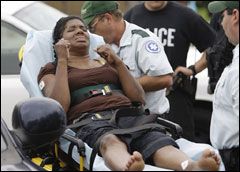Sarasota Herald-Tribune
 AP File Photo |
NEW ORLEANS — Think Louisiana dodged a bullet from Hurricane Gustav? Think again.
It is true that New Orleans escaped serious damage. But around the state, Gustav killed at least 23 people, according to official counts.
Even far inland, hundreds of thousands of people are still without electricity, a week after the storm hit. In a climate as hot and sticky as Florida’s, some Louisianans are facing long-term outages.
That is a miserable prospect, as Floridians can attest. In August 2004, parts of Arcadia and Charlotte County endured weeks without electricity after Hurricane Charley. The following year, thousands of South Florida residents did without after Hurricane Wilma struck in late October.
Only those who actually experience a hurricane can fully understand the disruption, the discomfort, the economic angst, the boredom and the stress of it. Now, Gustav has broadened the membership of that unfortunate club.
‘People are starting to lose it’
In East Baton Rouge Parish (home of Louisiana’s state capital), about 100,000 people are still without electricity. We talked to a few of them Monday, via cell phone service and intermittent e-mail. The connection was sketchy, but their stress level was loud and clear as they described a city that looked like a “war zone.”
“People are starting to lose it a bit,” wrote Stephen Harris, a native of Baton Rouge and a former Herald-Tribune employee. “You can see the frustration, especially at major intersections with no working traffic light.”
Harris, an investment officer with the Louisiana School Employees’ Retirement System, said even his “upbeat” neighbor was running out of steam: “The tree that hit his home has led to mold in/on the walls and the floors are ruined.”
Insurance delays, closed schools and bored, overheated children were common themes among others to whom we spoke. Much like the victims of Hurricane Charley, they struggle with a sense of powerlessness, are overwhelmed at times by the organizational challenge of living by candlelight, and marvel at their 18th century forebears, who somehow survived without electricity.
Gustav scared them, badly. They worry that Hurricane Ike — which was ravaging Cuba at press time Monday and was expected to hit the upper Gulf Coast later this week — could hurt far more people and derail Louisiana’s recovery.
Floridians surely know that feeling, after suffering seven hurricane landfalls in 2004 and 2005.
Red Cross in need
Ike’s projected path should miss most of our state. But it is not reassuring to learn that as hurricane season reaches its peak, the national Red Cross disaster fund is running on borrowed money.
A sour economy and a summer of Midwest floods, Western wildfires and Southeastern storms has emptied Red Cross coffers, the organization explained. It has gone into debt to help shelter and feed the thousands in Louisiana who still lack power. Other aid groups, such as Salvation Army and Save the Children, also are running deficit operations there, according to The Washington Post.
These “first responders” provide critically important aid — such as manning Red Cross shelters — in an emergency.
The people of Louisiana and Florida know just how bad life is after a hurricane. But we would hate to learn how much worse it could be without the Red Cross and other aid groups on the scene.











